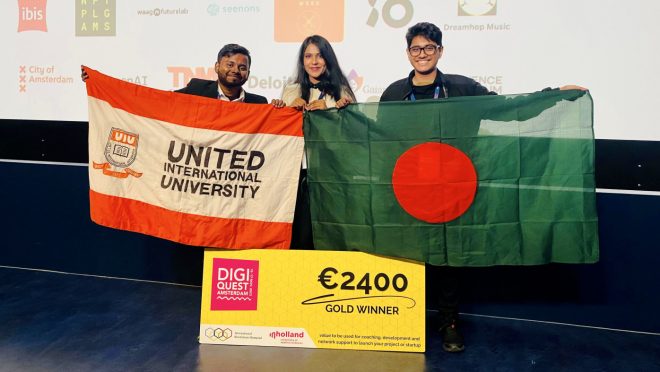IPBlockchainPro: An invention by Bangladeshi students that could revolutionise the IP landscape
The blockchain project by a Bangladeshi team won gold at the International Blockchain Olympiad 2023. It aims to protect, commercialise and manage intellectual property for small scale innovators, researchers and SMEs
IPBlockchainPro: An invention by Bangladeshi students that could revolutionise the IP landscape
The blockchain project by a Bangladeshi team won gold at the International Blockchain Olympiad 2023. It aims to protect, commercialise and manage intellectual property for small scale innovators, researchers and SMEs

It’s not everyday you witness a victorious team from Bangladesh hoisting the red and green flag of ours on the stages of an international competition. If the most recent ‘international’ tournament, that is the recently concluded ICC Men’s Cricket World Cup is anything to go by, the Bangladeshi flag is more accustomed to languishing right at the bottom.
However, a Bangladeshi team of four university students who have a fancy for the ‘tech’ side of things, participated in the International Blockchain Olympiad 2023 and won the entire competition in Amsterdam, on November 17.
Founded in 2017, The International Blockchain Olympiad (IBCOL) is an annual competition for students to solve real-world problems using Web3 and blockchain technology. There, Team Apocalypse presented their project, ‘IPBlockchainPro,’ a comprehensive ecosystem for protecting, commercialising and managing intellectual property.
The Business Standard spoke to the team leader Sadia Ahmmed, who provided us with insights regarding their project and the experience of winning gold overseas as the first Bangladeshi team at IBCOL.
“Our project essentially is an ecosystem built for protecting, commercialising and licensing almost everything that deals with intellectual property like patents, trademarks, industrial designs – basically any new invention,” said Sadia.
She said that ‘big’ companies can hire the best lawyers and outsource the responsibilities to experienced tech professionals, but for smaller scale entities, it’s not that easy, because the processes of the patent registration system are very complicated. For some, it might even take around 18-30 months to receive a patent.
“We primarily focused on single innovators, researchers and SMEs and that’s why we came up with the idea of IPBlockchainPro,” she added.
Apocalypse’s ‘IPBlockChainPro’ concentrated on two things – one was to establish an efficient system that streamlined all the processes, and the other part provided and ensured ‘digital’ security.
“First target was streamlining the system, then we created a connecting system that would connect the patent seekers – the SMEs and innovators with the licensors,” said Sadia.
“We used AI to streamline the process and make it faster and more efficient and applied blockchain technology to prevent any sort of data leaks, so that no one can tamper with the data and everyone’s records remain safe.”
It wasn’t that long ago when around five million NID card data were stolen from Bangladesh. Given that context, an application of such technology is something that the system is in dire need of.
“Bangladesh needs something like this more than ever,” she stressed.
The team believes that their project can contribute to achieving Sustainable Development Goals 8: Decent work and economic growth; 9: Industry, innovation and infrastructure; 16: Peace, justice, and strong institutions; and 17: Partnerships for the goals.
Sadia says the judges in Amsterdam really bought into the idea of how Team Apocalypse’s project can be applied for the greater good. That it’s not only a helpful system that would benefit people and users, but that the idea is sustainable and the project is scalable.
Team Apocalypse had four members. Three of them dealt with the ‘tech’ side of things while another looked after the ‘business’ side.
Jishanul Islam, Sahid Hossain Mustakim and team lead Sadia Ahmmed are from United International University (UIU) while Aadiba Tasneem Anam studies Business at North South University (NSU).
“Jishan was our tech lead, Mustakim designed our prototype and supported us in making the presentations. We have been teaming up since our first year at the university. We work really well and we have also won back to back competitions [intra university],” said Sadia.
The fourth member, Aadiba, was a friend of Sadia’s since their college days. The team needed someone on the roster who had a background in business studies to assist them. In simple terms, they needed someone who could really ‘sell’ the project and in came Aadiba.
“She really helped us in understanding how to design the business model,” said Sadia.
IBCOL 2023 saw participation from 20 countries, including Bangladesh, Canada, China, Hong Kong, India, Italy, Malaysia, Mexico, Netherlands, Russia, Ukraine, United Kingdom, and Vietnam. The event brought together 45 teams in total, with Team Apocalypse securing the world champion title for their project, earning them a €2,400 prize money and a certificate for their outstanding achievement.
“Competing against these countries did make us a little nervous, but we never wanted to return empty handed. When we got on stage after winning and held up our flag, that’s when it hit us that it’s our first gold award. Honestly, it just gives me goosebumps thinking about it,” she concluded.


